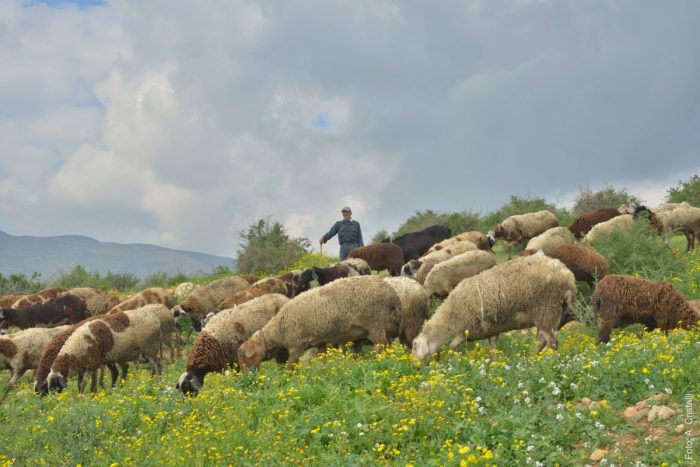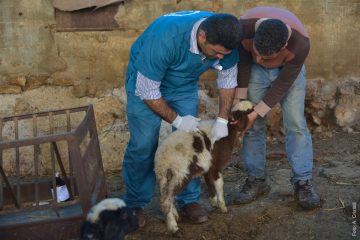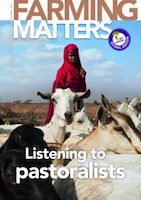Pastoralist societies face many difficulties when their traditional livelihoods change, and when sedentarisation becomes the norm. A local organisation providing livestock services, as seen in Palestine, can play a very important role.

Bedouins have lived in the Negev desert and Galilee for thousands of years. By means of mobile herding and farming, they thrived in a heterogeneous ecosystem with different levels of aridity. They selected sheep and goat ecotypes creating pure breeds and refined a livelihood characterised by sensitivity for the environment, hospitality, openness and ingenuity. But since the 1940s, they have faced enormous challenges. Especially since the Israeli occupation in 1967, most Bedouin families have gradually become sedentary. This is largely the result of having a growing number of families and livestock confined in a relatively small area; and at the same time, the adoption of alternative sources of income. But it is also a result of the presence of Israeli settlers and competition for land. Since 2014, a total of 3,860 new settlement units have been announced, and it is estimated that today, there are more than 500,000 settlers in the West Bank.
Problems when ‘hanging in’
Bedouins who have not stopped raising animals stillsee themselves as pastoralists. They feel that theirculture and, essentially their livelihood strategies, have not changed. But they are not always ready to respond to the new challenges. The process of fencing and confining small and large ruminants in pens and stables brings several needs. For instance, replacing grazing with the purchase of forage, and providing animals with well water are common challenges in terms of organisation and finances. Investing in proper animal housing and buying hay or agricultural by-products requires funds and knowledge. It also forces people to adopt proper hygiene practices for disease prevention – especially when there are no veterinary services. These aspects are all connected to an overall farm management strategy, and include the need to develop and implement a business plan.
For many reasons, those who have joined a sedentary life have not received the necessary support from the authorities, nor have they benefited from the plans, policies and services that have been tried at different levels. Bedouins have secured sufficient food for their communities. But the Palestinian Authority has not been able to secure the funds which are necessary, nor the expertise and skills, to provide the support they need. Making a difficult situation even harder, the West Bank has seen record levels of animal diseases and zoonoses in the past few years (such as brucellosis, chlamidiosis, toxoplasmosis and salmonellosis). All of them affect animal production and reproduction, and many affect humans as well. International organisations have provided support and tried to address these issues with both emergency and development initiatives that try to work with Bedouins and address their needs.
Sourcing support
Among these initiatives, one of the most promising has been the establishment and growth of the Palestinian Livestock Development Center (PLDC), based in Tubas, since 2004. PLDC pursues the development of the rural animal production sector, focusing on small ruminants. In order to do this, it delivers technical services to farmers, and at the same time it works to develop the technical capabilities of small ruminant breeders. PLDC is an endogenous self-help initiative established by members of the Palestinian civil society and Bedouin pastoralists. At the moment, it has 400 members each paying 120 shekels per year (about US$30). This gives them the right to vote in all meetings, to elect its authorities, and also to receive services.

With five veterinarians and two agronomists working as mobile units, they deliver veterinary assistance and artificial insemination services. Diagnosis is supported by a fully equipped laboratory, while feed is produced by two mills. It also plays another important role: it helps the Ministry of Agriculture to fulfill its role as implementer of veterinary policies for delivering prophylactic vaccination, animal disease diagnosis and artificial insemination. Since 2007, PLDC has received support from Oxfam, and it has therefore been able to reach a larger number of people, covering the area controlled by the Israeli Civil Administration (also known as Area C).
A good example
Even if sedentarisation is not the preferred route of all pastoralists, it is seen by many as an inevitable process, and as a trend which is unlikely to stop. But when Bedouins settle down permanently, they still see themselves as pastoralists, even if under different conditions. Therefore, they need support for adapting to these new conditions. The authorities often consider that their contribution to the local or regional GDP is negligible, and therefore not worthy of any investment. In many cases, the international aid system has helped fill these gaps, but the possibilities of providing a sustainable contribution are limited. Endogenous initiatives supported by external actors seem to be a successful approach, even if it is clear that they need to be nurtured for several years before they can stand on their own feet. PLDC is showing that local solutions are the best option.
Alesssandro Cristalli (allesandro.cristalli@oxfam.it) is program development advisor for Oxfam, specialised in livestock based sustainable rural development.

